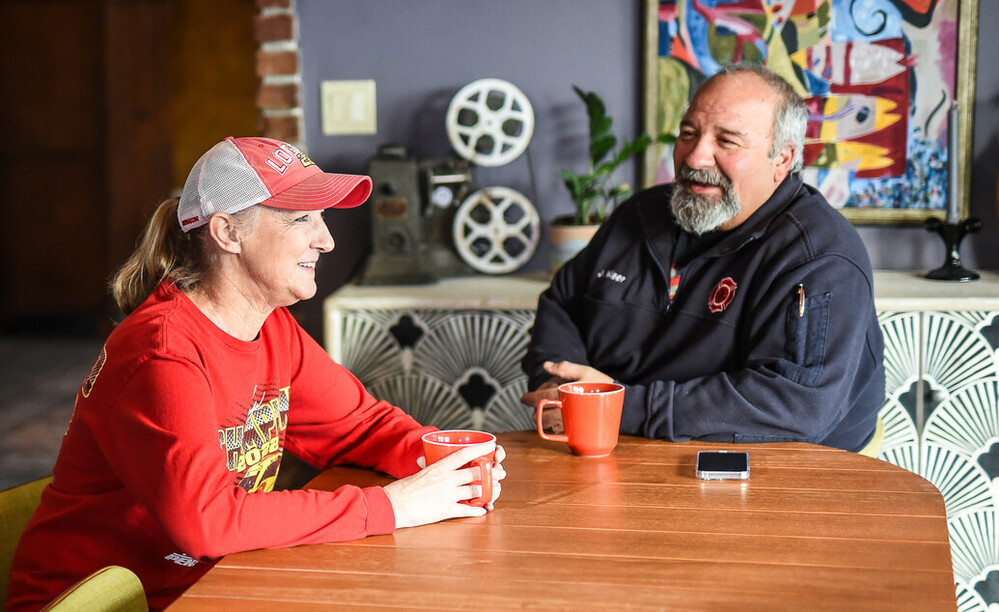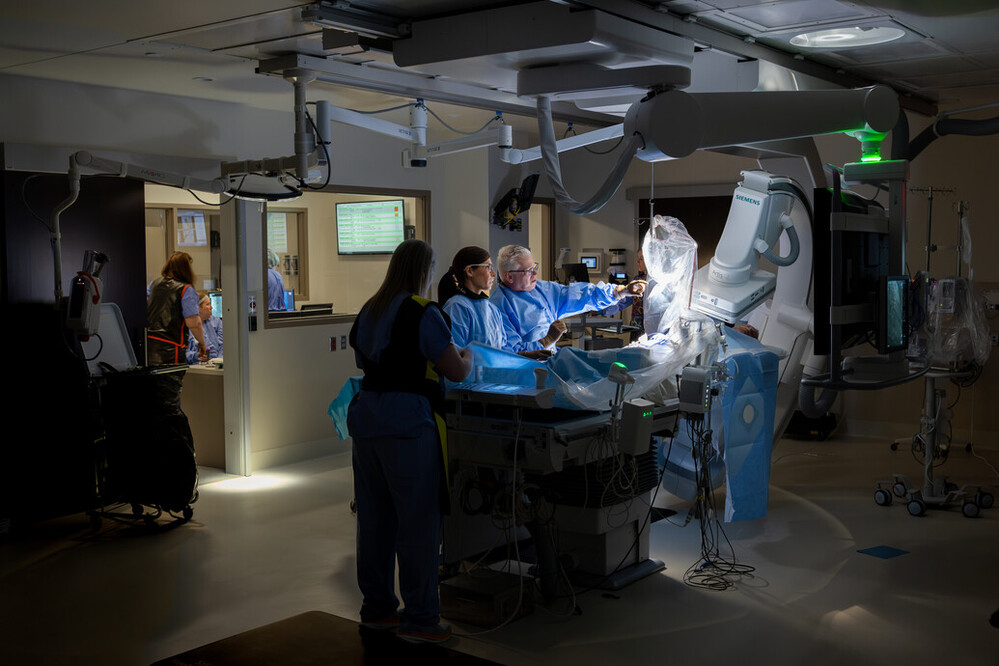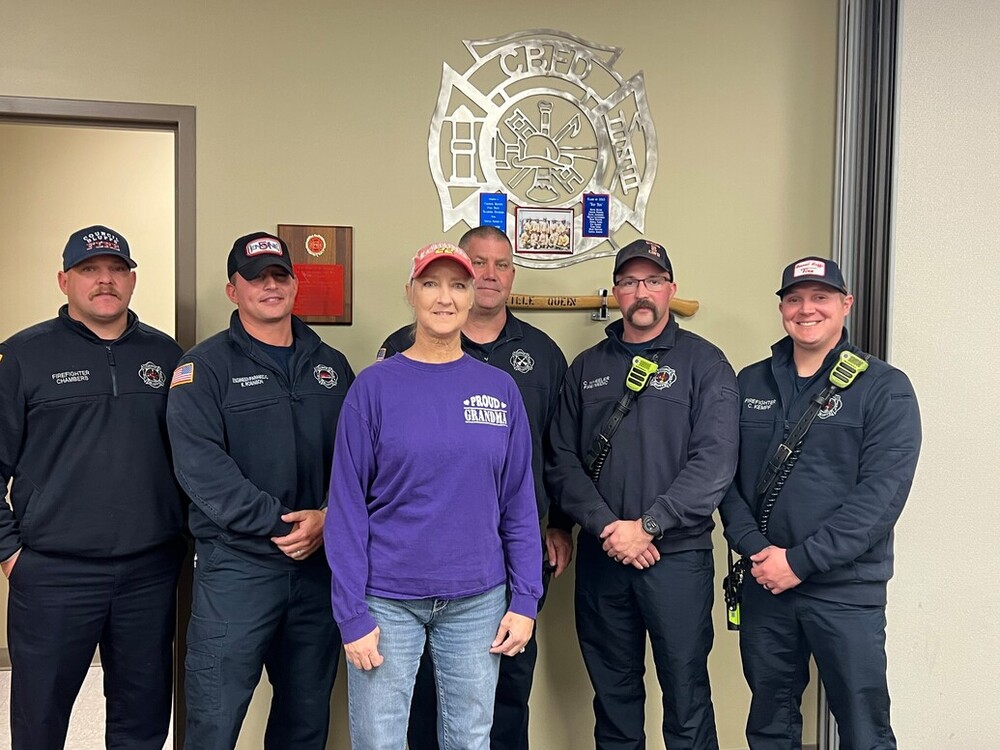
Inspiring Stories
‘Another chance at life’: Husband’s CPR training, Jennie Edmundson’s expert care help save woman after heart attack
Published: April 26, 2024
Jerry Wiser will never forget the day he helped save his wife’s life.
That morning last October started out like any other. But as the Council Bluffs couple watched the news before work, Kris Wiser said she wasn’t feeling well and went back to bed. Before long, she called her husband to the bathroom, where she asked for a wet washcloth to cover her chest and then began vomiting.
“I looked at her and said, ‘I really think you need to go to the hospital and get checked out,’” said Jerry Wiser, a volunteer firefighter and former emergency medical technician (EMT) in Tabor, Iowa.
Kris Wiser dismissed the idea and went back to bed. Soon, feeling even worse, she asked her husband to stay home from work. He remembers texting his boss, then turning around to find his wife convulsing and unresponsive.
At that point, Jerry Wiser’s training took over. He called 911, telling the dispatcher he thought his wife was having a heart attack. Then he put down the phone and began giving her chest compressions.
“I know what the odds are when you start CPR, and they’re not good,” said Jerry Wiser, who also works part-time as a firefighter instructor for the state of Iowa, teaching skills that include CPR. “As soon as I started CPR, the only thing going through my mind was that I was giving my kids time to say goodbye. It was quite possibly one of the worst days of my life.”
'A dire situation'
Kris Wiser has no memory of having a heart attack or what immediately followed. But her experience is a testament to the importance of CPR training, quick intervention by first responders and the expert care available at Methodist Jennie Edmundson Hospital.
“It seemed like I did compressions for an hour,” Jerry Wiser recalled, “but it was really a matter of three to five minutes.”
That’s when Council Bluffs firefighters – already nearby after finishing another call – arrived at the Wisers’ home. Kevin Robinson, an engineer paramedic on the scene, said it’s common for crews to respond to calls for people experiencing chest pain, having suspected heart attacks or being found after going into cardiac arrest. But a witnessed cardiac arrest like this, where a bystander can immediately offer aid, is rare.
“That’s the best-case scenario for us,” Robinson said. “CPR prolongs things, keeping your brain oxygenated and blood moving. It really increases the chances for survival. But we were really up against the clock, and we wanted to make sure we got our interventions done quickly.”
Still, out-of-hospital cardiac arrest is especially lethal. As many as 80% of such cases are fatal, according to the Centers for Disease Control and Prevention (CDC). In a race against time, Jerry Wiser had given his wife a strong start before Robinson and other first responders took over.
They continued CPR, intubated her, provided oxygen, started an IV and began using a LUCAS device, which provides precise automated compressions. Then they used an automatic external defibrillator (AED) to begin shocking her heart in hopes of re-establishing its rhythm.
During the ambulance ride to Jennie Edmundson, Robinson said, Kris Wiser’s pulse would briefly return before fading. The team continued using the LUCAS device and delivering shocks until arriving at the hospital.
Kris Wiser was where she needed to be for care. But with a floundering pulse and yet-to-be-discovered blocked coronary artery, there were still more questions than answers.
“This was a lethal arrhythmia,” said Kyle Kreger, MSN, RN, service leader for Critical Care at the hospital. “We instantly knew that this was a dire situation.”

'Am I doing the right thing?'
Jennie Edmundson is already known as a leader in specialty care – including cardiovascular services – in western Iowa. Now, with the community’s needs growing, the hospital and Jennie Edmundson Foundation are in the midst of a $6 million capital campaign to support a new cardiac catheterization suite with the latest imaging and diagnostic equipment.
The 5,700-square-foot suite opened in April and includes:
- Two new catheterization labs
- A minor procedure room
- Four patient care rooms
- New imaging equipment
- A family waiting area
- A private patient consult room
- Staff offices, a locker room and a break area
For patients like Kris Wiser, state-of-the-art tools in the hands of Jennie Edmundson’s skilled staff can mean the difference between life and death.

In her case, emergency medicine physician Tom Cheatle, MD; cardiologist Robert Armbruster, MD; and Kreger were among the many staff members who immediately went to work. They gave her medications, continued using the LUCAS device, kept shocking her and performed a cardiac catheterization that revealed the blocked artery on the right side of her heart.
The team needed to stabilize her heartbeat before addressing the blockage, which meant more shocks and CPR. After about 30 minutes, Dr. Armbruster said, he considered stopping the efforts.
“When you’re in the cath lab, sometimes you wonder, ‘Am I doing the right thing? Am I doing too much? Should I stop now?’” Dr. Armbruster said. “But when we would shock her, she would give me a few seconds of normal beats. She did seem to respond, so that was my motivation to keep going.”
Kris Wiser received 62 shocks that day before stabilizing long enough for Dr. Armbruster’s team to go to work. It inserted a stent into the artery, then inserted a balloon pump to aid her heart in pumping blood. Finally, her arrhythmia settled enough that she could be transferred to the Critical Care Unit.
“Now we can take a breath,” Dr. Armbruster remembered thinking. “But after something like this, you never know how it’s going to turn out neurologically.”
Said Jerry Wiser: “I didn’t think the odds were improving until she got to the ICU. And then I knew the odds weren’t really good. I just knew they were better.”
Lucky to be alive
After all Kris Wiser had been through, doctors prepared her family for the possibility of a difficult path ahead and lasting neurological damage. But she was about to show everyone how strong she was.
Jerry Wiser attributes his wife’s recovery to her fighting spirit and the care from Jennie Edmundson staff.
“Everybody on the ICU floor – I can’t say enough good things about them,” he said. “I don’t have the words to describe the kind of care she was getting. It was above and beyond.”
Nearly every day, she showed signs of progress: having her balloon pump removed, being taken off the ventilator, eating on her own and beginning physical therapy.
By Day 7, alert and returning to her old self, she was moved from Critical Care to the Progressive Care Unit. That’s when the enormity of the experience began to sink in for her.
“What first came to mind was I had a sister who was almost 60 years old when she had a massive heart attack and died,” said Kris Wiser, who turned 59 on her second day at Jennie Edmundson. “I think I realized how lucky I was that I was alive.”
She added: “After I finally woke up in the hospital and started seeing the nurses, every time I would see one that saw me downstairs, they’d say, ‘Oh, my God. You’re a miracle.’ They never thought someone would live through that.”

A new outlook
Thirteen days after arriving at Jennie Edmundson, Kris Wiser was discharged. Over the next eight weeks, she regained strength and mobility through cardiac rehabilitation, physical therapy, occupational therapy and speech therapy – all at Jennie Edmundson.
Then, on Jan. 2, with no lasting effects from her experience, she returned full time to her job as a crop insurance underwriter.
“New year, new me,” Kris Wiser said. “And a new outlook on life. I’m just going to try to enjoy every day that I can.”
That means spending more time with her grandchildren, enjoying nature and taking motorcycle rides with her husband.
Jerry Wiser said he almost can’t believe his wife’s recovery, and he’s not taking it for granted.
“I’ve got my best friend back,” he said. “It’s the most wonderful feeling in the world knowing that she’s home. People don’t know how lucky they are to have that. I almost didn’t.”
Their story is a testament to his quick action and the teamwork that followed – from the first responders to staff members from across Jennie Edmundson.
“She went from essentially dead to having another chance at life,” Dr. Armbruster said. “But it took many hands. Many people. Everything that happened, it happened in a sequence that it had to be right there, right now and perfect.”
Said Kris Wiser: “I’m glad that the ambulance went to Jennie Ed. I think that’s what saved my life: the team up there that chose not to give up on me.”
More Resources
- Read more from the spring/summer 2024 issue of The Meaning of Care Magazine.
- Learn more about Methodist Jennie Edmundson Hospital’s new cardiovascular suite.
- Learn how you can support Jennie Edmundson Foundation’s capital campaign for the suite.
- Register for CPR courses through Nebraska Methodist College.


